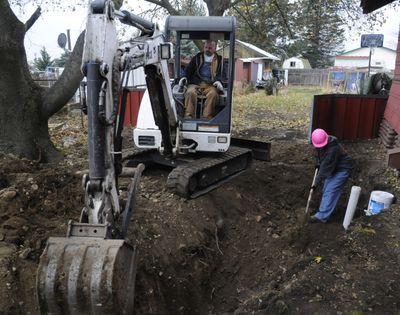Program helps define new skills for success

Life has given Larry Miller a second chance. And he’s decided to run with it.
At 46, the Spokane Valley resident was laid off from his excavation job in June 2008. With a family to support, a growing stack of bills and impending foreclosure on his home, he wasn’t sure what he was going to do.
He scraped by on unemployment for five months. Then the Washington state Department of Employment Security contacted Miller and told him he was a good candidate to start his own business. The state offered to pay for part of an Avista-sponsored entrepreneur program through Spokane Community College.
Now he’s running Larry Miller Excavating.
While Miller said that retraining midcareer is “scary, hard and intimidating,” he’s familiar with starting over. It began, like most things, with family.
“I’ve got one in diapers and one in Afghanistan,” he said. He and wife Melissa, both previously married, have seven children between them. Miller’s 25-year-old son, Logan, an Army sergeant, is on his second tour of duty in Afghanistan. Their youngest, Lilly, is 2.
Miller graduated from the entrepreneur program and began his new career.
“On Friday the 13th of March 2009, I got my business license. And April Fool’s Day was my first official day of business,” he said.
Some might have regarded those dates as bad omens, but Miller thought they were funny. And now he operates in the black. Only a month shy from being out on the street, his gamble paid off. “I pulled my house out of foreclosure after the very first job,” he said.
How did he do it? “I took a risk,” he said.
But his wife says there was more to it than that. “Larry is really good at what he does, and he gets the job done right the first time. Before he went into business for himself, he’d built a good reputation,” she said.
The excavation business specializes in sewer and water hook-up, septic installation, foundation excavation, basement and swimming pool dig-out, rock and landscape placement and driveway and site improvement.
The couple went door to door to promote the new business. They discovered early on that they needed to stay on top of marketing. “We learned, once you drop that ball, it’s hard to pick it up again,” Larry Miller said.
A willingness to take risks wasn’t the only thing needed to get his project off the ground.
“It also took family support and persistence, a willingness to adapt … and sheer faith,” he said.
Melissa’s grandfather, Allen Knoles, also took a chance by investing in the excavation business.
“This is your inheritance,” Knoles told the couple. “Use it wisely.”
Melissa’s father, Gary Knoles, manages the company and knows that his son-in-law will succeed.
“He’s got a great team behind him. We’ve all got a piece of the action, so we want to see him succeed,” he said.
Starting over isn’t particular to Larry Miller. Business trends during a recession suggest that reinventing one’s self is common. Washington state has always tried to take unemployed laborers and upgrade their skills, making them more marketable in a changing environment, according to Doug Tweedy, regional economist for Washington Employment Security Department.
But the construction business was particularly challenging, Tweedy said. “At the height of the recession, commercial building was up, while residential was down. This was difficult, as a lot of laborers were primarily skilled in residential construction,” he said.
The focus for retraining programs is taking the skills of workers in a given field, then expanding that knowledge base so that however the market presents itself, they are able to fit in, Tweedy said.
“After the retraining,” he said, “they are more flexible in their chosen field, in any given environment.”
Miller now gives something back to the program.
“I’ve returned to the college to talk about my experience to others in the entrepreneur program that are starting their lives over, too,” he said.